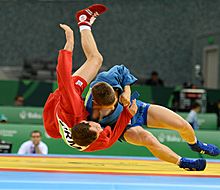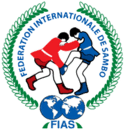Sambo (martial art) facts for kids

Sambo at the 2015 European Games
|
|
| Highest governing body | Fédération Internationale de Sambo |
|---|---|
| Registered as a sport discipline | Soviet Union, November 16, 1938 (Goskomsport) |
| Characteristics | |
| Contact | Yes |
| Mixed-sex | No |
| Type | Martial art |
| Equipment | Sambovka |
| Presence | |
| Country or region | Worldwide |
| Olympic | No |
| World Games | 1985, 1993 |
 |
|
|---|---|
| International Federation of Amateur Sambo |
|
| Also known as | Sombo (in English-speaking countries) |
| Focus | Hybrid |
| Country of origin | |
| Famous practitioners | Practitioners |
| Parenthood | Sport Sambo:
|
| Olympic sport | No, but IOC recognized |
Sambo (Russian: са́мбо) is a martial art from the Soviet Union. It is also a combat sport and a type of amateur wrestling. The word sambo is a short form of a Russian phrase. That phrase means 'self-defence without weapons'.
Sambo started in the Russian SFSR in the Soviet Union. The official English spelling, used by some sports groups, is SOMBO.
Contents
What is Sambo?
Sambo is a fighting style that combines the best moves from many other martial arts. It was created in the early 1920s. The Soviet police (NKVD) and army (Red Army) developed it. They wanted to make their soldiers better at hand-to-hand combat.
Who Created Sambo?
Two main people helped create Sambo: Viktor Spiridonov and Vasili Oshchepkov.
Vasili Oshchepkov's Story
Vasili Oshchepkov spent many years in Japan. There, he trained in Judo with its founder, Kanō Jigorō. Oshchepkov learned a lot from Judo. Sadly, he later died in prison. He was wrongly accused of being a spy.
Viktor Spiridonov's Story
Viktor Spiridonov developed his own style of fighting. It was softer and needed less strength than Oshchepkov's style. This was partly because Spiridonov had injuries from World War I.
How Sambo Developed
Spiridonov and Oshchepkov worked on their styles separately at first. Oshchepkov's system was known as "free wrestling." Over time, their ideas mixed together. This led to the Sambo we know today.
Anatoly Kharlampiev, who was a student of Vasili Oshchepkov, also helped create Sambo. In 1938, Sambo became an official sport in the USSR.
See also
 In Spanish: Sambo para niños
In Spanish: Sambo para niños
 | Emma Amos |
 | Edward Mitchell Bannister |
 | Larry D. Alexander |
 | Ernie Barnes |

